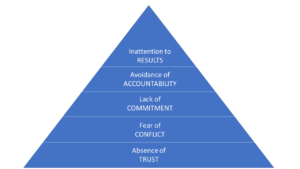What are the five dysfunctions of a team?
According to Patrick Lencioni, dysfunctional teams are characterized by:
- Absence of trust
- Fear of conflict
- Lack of commitment
- Avoidance of accountability
- Inattention to results

Absence of trust
Trust is the foundation of any positive and productive relationship.
Members of effective teams trust each other, communicate openly, and share their opinions. They don’t fear showing their strengths and weaknesses or acknowledging their mistakes.
In dysfunctional teams, people hide their weaknesses and mistakes. They hesitate to ask for help or offer help, and avoid spending time together.
Fear of conflict
When there is trust, team members are not afraid to express different ideas or disagree with each other for the sake of the company. They feel safe and confident in exchanging different points of view that can help their team achieve common goals.
Dysfunctional teams avoid controversial topics that may be critical to collective success. People tend to be defensive. They don’t openly exchange different ideas or opinions. There may be personal attacks and “political” behaviors.
Lack of commitment
Teams that feel safe sharing their opinions and ideas are engaged in decision-making. This increases the commitment of any team member.
Dysfunctional teams are not committed to shared decisions, procedures, or goals.
Avoidance of accountability
Teams that are engaged and committed to decisions hold one another accountable for the different activities and outcomes. Each member of the team is accountable, not only the leader.
In dysfunctional teams, the accountability burden is excessively posed on the leader. It’s not spread among all the members. There may be general resentment, mediocrity, and low performance.
Inattention to results
Teams in which there is trust, acceptance of different opinions, commitment, and personal accountability are also focused on common goals. When team members trust each other, feel safe, and are committed. They are more willing to put aside their own egos and personal agendas to pursue collective success.
Team members of dysfunctional teams concentrate on their individual goals, not the company’s ones. Employees tend to be distracted, are not motivated to beat their company’s competitors, and most achievement-oriented professionals look for other employers.
Do you want to improve teamwork in your company?
As a business and organizational psychologist with over 14 years of experience building and improving teams, I can provide you with customized consulting, training, and coaching.
Let us make your team effective, productive, and efficient. Contact me.
Andrea Miriello
Business and organizational psychologist

